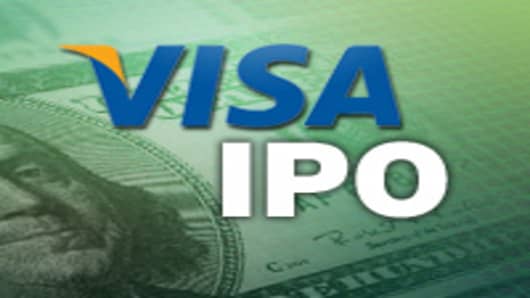Visa, the world's largest credit card network, raised $17.9 billion in its initial public offering Tuesday night, making it the largest US IPO ever.
San Francisco-based Visa, sold 406 million class A common stock for $44 per share, compared with a forecast range of $37 to $42 a piece, according to an underwriter.
Underwriters, led by JPMorgan and Goldman Sachs, have the option to purchase an additional 40.6 million shares to cover overallotments, according to an amended registration statement with the Securities and Exchange Commission.
The VISA IPO easily surpasses the $10.6 billion offering in 2000 by AT&T Wireless Group. San Francisco-based Visa plans to list on the New York Stock Exchange under the symbol "V."
The timing of Visa's offering is risky, as worries that the U.S. economy might be entering a recession have chilled investor demand for stocks and IPOs. But demand for Visa shares is expected to be strong.
"Visa is large, and has strong global growth potential," said John Augustine, chief investment strategist at Fifth Third Private Bank in Cincinnati. "The downside to the Visa offering may be the timing. Our fear is that as credit deteriorates, consumer spending will go down, and volumes will go down for the card networks. That would hurt revenue and profit."
Investors may hope Visa shares will fare as well as those of smaller rival MasterCard.
MasterCard shares have more than quintupled since that Purchase, New York-based card network went public in a $2.4 billion IPO in May 2006.
The stock has risen by about one-fourth since mid-2007, even as the credit crisis began to widen beyond subprime mortgages. The Standard & Poor's financial index is down about the same amount over that time.
"MasterCard has been an explosive stock, and investors may hope Visa will be the same," said Steve Roukis, a managing director at Matrix Asset Advisors Inc in New York, which invests $1.7 billion.
In the fourth quarter of 2007, Visa posted net income of $424 million on revenue of $1.49 billion, according to the SEC filing. MasterCard posted net income of $304.2 million on revenue of $1.07 billion.
Visa is controlled by about 13,300 member banks and finance companies. Many of these are struggling with mounting credit losses, and some with capital shortfalls.
"There could be added volatility (in Visa shares) if some of the member banks begin to sell their holdings, perhaps to shore up capital," Fifth Third's Augustine said.
Visa intends to set aside $3 billion of net proceeds to cover a wide variety of antitrust and other litigation.
These involve issuers such as American Express and Discover Financial Services, as well as major retailers that have accused card networks of price fixing.
Visa also intends to use $10.2 billion of net proceeds to redeem other shares, and the balance for general corporate purposes. It plans to pay a 10.5 cents per share quarterly dividend, for a dividend yield of about 1 percent.


